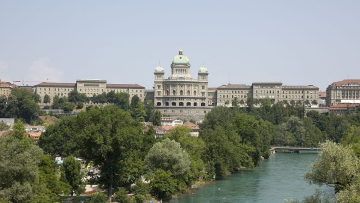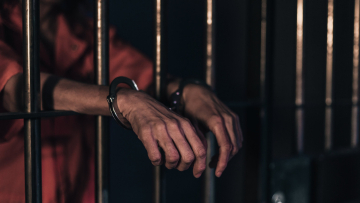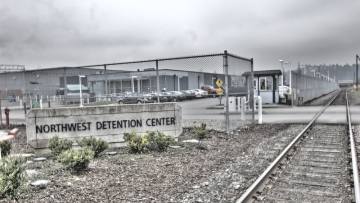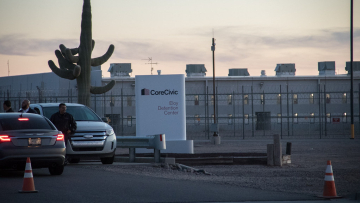
Company – Target
This profile is a priority campaign targetBankTrack
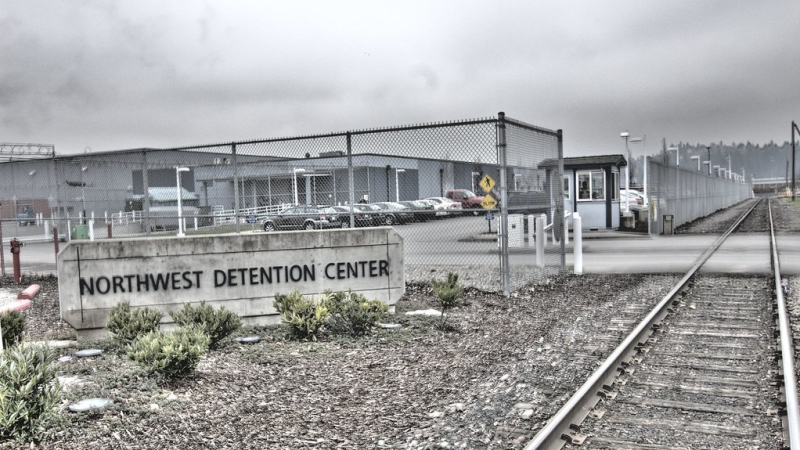
Company – Target
This profile is a priority campaign targetBankTrack
Why this profile?
GEO Group profits from the incarceration of migrants and their use as a source of cheap labour. Since President Trump returned to office, his administration’s aggressive immigration enforcement policies have led to a significant rise in incarceration rates within private prisons across the United States. Detainees, including migrants, asylum seekers, and sometimes families with children, often face rights abuses, like poor living conditions and exploitative labour practices.
What must happen
Given the well-known and protracted nature of the human rights violations at GEO Group’s facilities, banks and other financial institutions should stop financing GEO Group and divest of holdings in the company that they own or manage, including nominee shareholdings and shares invested in index funds.
| Sectors | Prisons and Immigration Detention |
| Headquarters |
|
| Ownership |
listed on NYSE
GEO Group's largest shareholders are Blackrock and the Vanguard Group. A full overview of the company's shareholder structure can be accessed here. |
| Subsidiaries |
BI Incorporated – United States
GEO Care – United States GEO Group Australia – Australia GEO Group UK – United Kingdom South African Custodial Management – South Africa |
| Website | https://www.geogroup.com/ |
GEO Group owns and operates private prisons and detention centres. Originally established as the Wackenhut Corrections Corporation in 1983, GEO Group facilities include prisons, immigration detention centres, minimum-security detention centres, and mental health and residential treatment facilities totalling 100 facilities. GEO Group is headquartered in the United States and manages facilities in North America, Australia, South Africa, and the United Kingdom.
Social and human rights impacts
Mistreatment of detained persons GEO Group, together with CoreCivic, is one of the major managers of Immigration and Customs Enforcement (ICE) detention centres. These companies have been described as relying "on a business model based on forced labour" and are linked to evidence of inhumane conditions, abuse and death at their facilities. The Department of Homeland Security Office of Inspector General, which oversees ICE, issued a damning 2021 report documenting widespread abuse at ICE detention centres. At a GEO Group-run facility in California, inspectors found significant health and safety risks, including nooses in cells, excessive use of segregation, and inadequate medical care. A follow up review of 17 ICE facilities, including those of GEO, between 2020 and 2023 revealed ongoing, systemic violations of medical, safety, and environmental standards.
During the COVID-19 pandemic, the United Nations raised serious concerns about the poor health, unsanitary conditions, and mistreatment of detainees at GEO Group's Northwest Detention Center (NWDC) in Tacoma, Washington. Due to the alarming situation at NWDC, Global Rights Advocacy, La Resistencia and Seattle University International Human Rights Clinic urgently requested precautionary measures from the Inter-American Commission on Human Rights (IACHR), the principal body responsible for promoting and protecting human rights across the Americas. The IACHR’s decision confirmed the “seriousness, urgency, and irreparability” of the harm caused to those detained s, calling on the state of Washington to safeguard the rights of all migrants held at the NWDC. In October 2024, the IACHR conducted the first visit to the NWDC and spoke directly with beneficiaries demanding to be released due to the abuses.
Forced labour Detainees at GEO Group’s facilities are allegedly forced to work for as little as $1 per day, often under threat of punishment or loss of privileges. Some detainees have claimed they were not given adequate training or safety equipment. These allegations have repeatedly been raised with the company throughout the years, and in numerous instances lawsuits were filed. A series of lawsuits have been filed in federal courts from Washington to Georgia in the United States since 2014, claiming GEO Group violates minimum wage, unjust enrichment, and anti-slavery laws by coercing detainees to work for very little or no compensation.
Deaths at detention centres GEO Group runs detention facilities for profit, which means that cost-cutting measures are often implemented to reduce expenses. This can result in inadequate medical care, understaffing, and inadequate training for staff, all of which can contribute to an increased risk of deaths among detainees. A 2018 report by Human Rights Watch, and three other organisations working to advance the rights of detained immigrants, found that most detainee deaths are linked to largely inadequate medical care.
GEO Group’s Adelanto ICE Processing Center in California is notorious for abusive conditions, and subpar medical care practices which have in many cases resulted in suicides or preventable deaths. Examples include the case of Mr. Jose Asurdia, who died in detention after a nurse ignored clear symptoms of a heart attack; Mr. Martin Vergas, who asked to be moved because of being severely ill and at high risk of contracting COVID-19, and eventually died from the disease; Mr. Vincente Caceres-Maradiaga and Mr. Sergio Alonso Lopes who did not receive the medical attention they needed; and Mr. Gonzales-Gadba who committed suicide. All died within a period of three months, making Adelanto the deadliest US detention centre facility in 2017.
More recent examples include Mr. Ahn, who had a history of struggling with mental health issues and committed suicide in 2021 after being put in solitary confinement at GEO Group’s Mesa Verde facility, and a Nicaraguan asylum-seeker who died at GEO Group’s Aurora centre in 2022 from an embolism tied to an untreated injury, which medical experts said illustrated “a larger pattern of preventable deaths among young, relatively healthy ICE inmates”.
Family detention and separation of children from their parents ICE contracts with several facilities to detain families with children. Two such facilities are maintained across the United States, both are in Texas. GEO Group runs the Karnes County Residential Center, which became operational again in early 2025 after the Trump administration reinstated family detention. The facility had previously paused operations under the Biden administration. As of March 2025, at least 100 families were known to be held there. These facilities have a reputation for keeping parents and children in unsafe conditions without proper medical care. During the COVID-19 pandemic, 185 children were detained in unsanitary conditions, including at GEO Group-run centers.
In 2018, the US government implemented a zero tolerance policy that led to the separation of over 3,800 children from their parents at the border. Many of these children were held at GEO Group’s facilities. Civil society organisations accused GEO Group of profiting from family separation and detention. In response, a shareholder resolution was filed in 2019 urging the company to cease housing immigrant children or parents who had been separated by US government actions.
Other impacts
Rioting and hunger strikes Detainees at GEO Group facilities often protest against poor conditions. For instance in 2017, a facility-wide, eight-hour riot broke out in GEO Group's facility in Hinton, Oklahoma. Four hundred of the 1,940 federal inmates refused to leave the recreation yards and took control of a building. In March 2023, 300 people at the GEO-run Central Louisiana ICE Processing Centre initiated a hunger strike; similarly more than 80 people also initiated a hunger strike at two GEO Group facilities, Mesa Verde and the Golden State Annex, against poor living conditions and “slavery wages”. The strikers were met with brutal and violent retaliation from prison staff.
Profiteering from detainees Detainees at GEO Group and Core Civic facilities are charged for all kinds of services and have to use for-profit money transfers, like Western Union or Global Tel Link, to pay for them. Phone companies can charge prisoners as much as USD 25 for a 15-minute phone call. Health care, ankle monitoring, drug testing and food services are outsourced to companies through lucrative contracts.
The U.S Immigration and Customs Enforcement agency during Covid-19 provided each person in custody with 520 phone minutes free of charge. However, as of June 2024, the project was stopped abruptly, leaving detainees without essential means to stay connected with loved ones and unable to prepare for their immigration cases.
Lobbying GEO Group has historically spent considerable sums on federal lobbying. In 2018 alone, it spent USD 1.56 million. Its efforts have focused heavily on securing and expanding federal contracts, particularly those related to immigration detention.. In 2024, GEO Group spent USD 1.38 million lobbying the federal government, with much of its focus on the Department of Homeland Security appropriations bill that funds ICE. The company also made a half a million dollar donation to the 2025 inaugural committee, doubling the amount it contributed to President Trump’s 2017 inauguration.
Lawsuits and expert opinions Throughout the years, GEO Group has faced numerous lawsuits relating to human rights issues. For example:
- In 2017 Washington State Attorney General Bob Ferguson sued GEO Group for paying detainee workers $1 per day for their labour at the Northwest Detention Centre in Tacoma. A federal jury in Washington State later ruled, in October 2021, that GEO Group owed $17.3 million in back pay to immigrant detainees who were denied minimum wage. GEO Group has appealed to this decision on the basis that detainees are not its employees and that an exemption on the payback for the government-run prisons should be granted to private ones. In December 2023, the Supreme Court of the State of Washington ruled in response to this class-action lawsuit that detained workers are considered “employees” therefore recipients of a fair wage under the Washington State’s Minimum Wage Act, no exception is applicable.
- In 2019, twenty-six immigrant fathers and sons sued GEO Group alleging that armed guards in their Texas-based detention centre used excessive force to separate them, in violation of a nationwide preliminary injunction against family separations. The lawsuit was settled in January 2023.
- In March 2020, the American Civil Liberties Union (ACLU) sued GEO Group for failing to release detainees it argued were at heightened risk of contracting COVID-19 because of cramped conditions and a failure to adopt precautions at the GEO-run Adelanto facility in California. This case is still ongoing.
-
In April 2020, the UN Special Rapporteur on the human rights of migrants, González Morales, urged the U.S. administration and the GEO Group to guarantee access to healthcare, water, and sanitation at the Northwest Detention Centre in Tacoma, Washington, amid concerns about the spread of COVID-19. The GEO Group-run facility faced repeated reports of unsanitary conditions and inadequate healthcare for its 1,500 detainees.
-
In October 2020, grassroots advocacy organisation Global Rights Advocacy obtained an opinion from the United Nations Working Group on Arbitrary Detention (UNWGAD) regarding Fernando Aguirre-Urbina, an immigrant who spent nearly seven years in prolonged civil detention at GEO Group’s Northwest Detention Centre in Tacoma, Washington. The UNWGAD confirmed that Aguirre-Urbina's detention contravened international human rights standards and requested his unconditional release, along with the right to compensation for the harm inflicted on him.
- In November 2021, GEO Group was ordered to pay $23.2 million for profiting since 2005 from the labour of detainees who were paid $1 a day instead of the Washington state’s minimum wage.
- In another instance, a lawsuit was filed in July 2022 by currently and formerly detained individuals at GEO Group’s Mesa Verde and Golden State Annex facilities in California, also on allegations of being forced to perform labour for GEO Group for just $1 a day. This case is ongoing.
- In February 2023, civil rights groups, including ACLU and Asian Law Caucus (ALC), filed a class-action complaint against GEO Group on behalf of 82 detained persons who have allegedly been punished for taking part in a hunger strike. The lawsuit alleges that excessive punitive measures were used, including invasive pat-downs and time in solitary confinement.
- Another lawsuit was filed in March 2023, when seven current and former detainees at the same GEO-run Adelanto facility alleged they were poisoned by a chemical agent used to disinfect the premises during the COVID-19 pandemic. Detainees reported symptoms such as burning eyes, skin irritation and fainting.
-
On July 30, 2024 the Washington State Department of Health filed a lawsuit against GEO over health inspectors being denied access to inspect the Tacoma ICE facility, alleging that the denial hinders their ability to ensure health and safety compliance. The inspector tried to enter the facility four times, and was denied access despite state legislation (HB 1470) granting authorities the right to conduct unannounced inspections. The Health Department reported receiving over 700 health complaints from individuals incarcerated at NWIPC since April 2023. Conditions within the facility continue to deteriorate, with detainees reporting poor hygiene, unsafe drinking water, and mistreatment.
These are just but a few examples of ongoing and settled cases brought against GEO Group in recent years.
As of May 2023, several banks (BNY Mellon, JPMorgan, Morgan Stanley, UBS, BNP Paribas, Bank of America, Goldman Sachs, Swiss National Bank, HSBC, Barclays and Credit Suisse) have substantive shareholdings in GEO Group. See below for more details.
Since Election Day in 2024, GEO Group’s stock has surged by about 41%, increasing the value of holdings for banks maintaining positions in the company, whether through active investments or passive index funds.
In 2019, several banks announced that they will no longer finance companies that operate private prisons and detention centres. These include Bank of America, Barclays, BNP Paribas, Fifth Third Bank, JPMorgan Chase, Truist Bank, and Wells Fargo.
Prior to this, six banks (BNP Paribas, Bank of America, Barclays, JPMorgan Chase, Truist Bank and Wells Fargo) financed GEO Group with:
● a credit facility of USD 900 million (extended in June 2019 to May 2024);
● corporate loans totalling USD 792 million (March 2018 - March 2024).
Despite earlier commitments, some banks, notably Bank of America and Wells Fargo, have walked back their 2019 pledges, reopening the door to new credit facilities to private prison operators like GEO Group, in certain cases.
In contrast, several investors have chosen to divest. Danish pension funds PKA and Lærernes Pension removed GEO Group from their portfolios in 2019, followed by PSP, Canada's largest pension fund, which fully divested in 2021. KLP, the Norwegian pension fund, also excluded GEO Group from its portfolios in 2022, citing human rights concerns. More recently, commercial banks like ANZ, Nordea and Danske Bank added GEO Group to their investment exclusion lists. Here are more investors that have excluded GEO Group from investments.
Applicable norms and standards
Who Makes Money From Private Prisons?
Today the private prison industry is largely dominated by two companies, GEO Group and CoreCivic. In 2019, the two companies had a tough year. From Families Belong Together protests that lead to Wall Street divesting to Democratic candidates saying that they will abolish the industry, if elected. After three decades of arguing it is morally wrong to profit from incarceration and detention, activists say this could be the beginning of the end for these companies.

